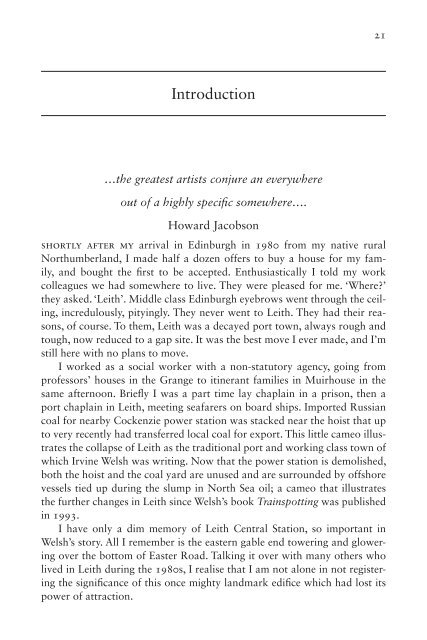Choose Life Choose Leith by Tim Bell sampler
By examining the book, the play and the film, Choose Life, Choose Leith both critically analyses the Trainspotting phenomenon in its various forms, and contextualises the importance of the location of Leith and the culture of 1980s Britain. Looking in detail at the history of Leith, the drug culture, the spread of HIV/AIDs, and how Trainspotting affected drug policy, Leith and the Scottish identity, the book highlights the importance of Trainspotting. Choose Life, Choose Leith acts as a reference book, a record of the times and a background as to the history that led to the real-life situation and the publication of the book.
By examining the book, the play and the film, Choose Life, Choose Leith both critically analyses the Trainspotting phenomenon in its various forms, and contextualises the importance of the location of Leith and the culture of 1980s Britain. Looking in detail at the history of Leith, the drug culture, the spread of HIV/AIDs, and how Trainspotting affected drug policy, Leith and the Scottish identity, the book highlights the importance of Trainspotting. Choose Life, Choose Leith acts as a reference book, a record of the times and a background as to the history that led to the real-life situation and the publication of the book.
You also want an ePaper? Increase the reach of your titles
YUMPU automatically turns print PDFs into web optimized ePapers that Google loves.
21<br />
Introduction<br />
…the greatest artists conjure an everywhere<br />
out of a highly specific somewhere….<br />
Howard Jacobson<br />
shortly after my arrival in Edinburgh in 1980 from my native rural<br />
Northumberland, I made half a dozen offers to buy a house for my family,<br />
and bought the first to be accepted. Enthusiastically I told my work<br />
colleagues we had somewhere to live. They were pleased for me. ‘Where?’<br />
they asked. ‘<strong>Leith</strong>’. Middle class Edinburgh eyebrows went through the ceiling,<br />
incredulously, pityingly. They never went to <strong>Leith</strong>. They had their reasons,<br />
of course. To them, <strong>Leith</strong> was a decayed port town, always rough and<br />
tough, now reduced to a gap site. It was the best move I ever made, and I’m<br />
still here with no plans to move.<br />
I worked as a social worker with a non-statutory agency, going from<br />
professors’ houses in the Grange to itinerant families in Muirhouse in the<br />
same afternoon. Briefly I was a part time lay chaplain in a prison, then a<br />
port chaplain in <strong>Leith</strong>, meeting seafarers on board ships. Imported Russian<br />
coal for near<strong>by</strong> Cockenzie power station was stacked near the hoist that up<br />
to very recently had transferred local coal for export. This little cameo illustrates<br />
the collapse of <strong>Leith</strong> as the traditional port and working class town of<br />
which Irvine Welsh was writing. Now that the power station is demolished,<br />
both the hoist and the coal yard are unused and are surrounded <strong>by</strong> offshore<br />
vessels tied up during the slump in North Sea oil; a cameo that illustrates<br />
the further changes in <strong>Leith</strong> since Welsh’s book Trainspotting was published<br />
in 1993.<br />
I have only a dim memory of <strong>Leith</strong> Central Station, so important in<br />
Welsh’s story. All I remember is the eastern gable end towering and glowering<br />
over the bottom of Easter Road. Talking it over with many others who<br />
lived in <strong>Leith</strong> during the 1980s, I realise that I am not alone in not registering<br />
the significance of this once mighty landmark edifice which had lost its<br />
power of attraction.

















